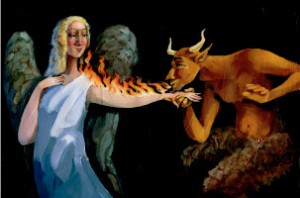 For clarity, let’s define “evil” as “the willful abuse of other humans.”
For clarity, let’s define “evil” as “the willful abuse of other humans.”
By this definition, any person or persons who purposely manipulate other humans to their own ends – anything from tricking them into a bad business deal to extorting money from them to murdering them – are engaging in evil.
Evil Almighty?
From television, politicians, and endless “authorities,” we sense that evil is pre-eminent. God may be supremely powerful, but he’s powerful somewhere far away; Evil is powerful here. We can slide into evil with ease, but being good is difficult. Western man is convinced that darkness is stronger than light, whether he defines it in religious terms or secular terms.
The fear-sellers, we must admit, have been winning.
This primacy of fear and darkness is necessary to authority of course; without it, how would we be driven into their arms?
So, when someone comes along and calls evil a weakling, we think they’re a bit crazy, and maybe we worry that the devil might notice and chop them down.
Fundamental Weakness
Carrying such fears, people seldom realize that evil is weak. And not weak temporarily or in a certain situation, but fundamentally weak. Here’s why: Evil does not produce.
Evil is massively wasteful: it burns crops, it breaks down bridges, it steals important, useful assets, and it kills people. Evil, therefore, must take advantage of healthy and effective life if it is to prosper.
Genghis Kahn had to get his arrows, horses, and shields from somewhere, and he didn’t produce them himself. Likewise for Mao and Stalin and Tamerlane and the rest. One way or another, they required basically decent people to produce for them. Regardless of whether these producers were tricked or intimidated, it was they who armed evil; evil didn’t arm itself.
And this brings us to one of the great, simple truths of our times:
If goodness ever stops allowing evil to take advantage of it, evil is simply finished.
The good don’t need the evil, but the evil are fully dependent on the good.
It is the good (or at least the basically productive) who permit evil to continue. These decent people are laboring under fears and flawed ideas of course, but without their acquiescence, evil could accomplish very little. And this is massively good news: Evil is vulnerable… deeply vulnerable.
Changing the Game
Right now, evil has tricked millions of productive people into doing its will. At this point, most think acquiescence is the right thing to do, or they simply don’t realize that any option exists. And being in that position, they accommodate themselves to it. This can be seen in the moral confusion that is currently endemic. How else could people believe that what is immoral for one person is somehow moral for another?
So, the very first step toward the defeat of evil is to clarify morality. And here we can get a quick start, because morality is simple. It boils down to this:
What is hateful to you, do not do to any man.
From there, we can move on to things like, “Do not encroach upon anyone or their property,” or, “Keep your agreements,” but those are just extensions of the first statement… and that’s all we really need.
Yes, application can be complicated, and some people are compelled to conjour strange exceptions, but those aren’t serious concerns. Send the one-in-a-million scenario to a specialist and get on with the other 999,999.
Act with integrity and you’re guaranteed to do the right thing 99.9% of the time. Do you think any of the complicated, academic systems of ethics can touch that percentage?
Furthermore, integrity is a simple concept that can be understood by any functional adult. This means that moral clarity is not only possible, but universally accessible.
Then What?
Once we’re clear on morality, we simply start calling things by their true names… and we don’t stop.
After that, evil openly displays its weakness every time it objects: It shows that it cannot abide – cannot survive – the persistence of simple truths.
**
Paul Rosenberg
www.freemansperspective.com
